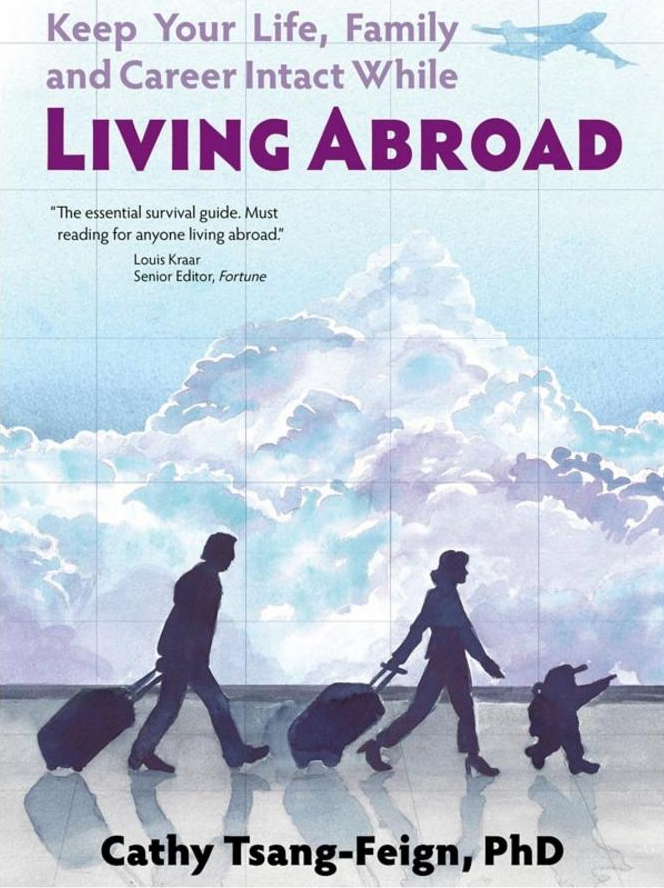Dr. Cathy Tsang-Feign is a psychologist who specializes in expatriates – she helps them cope with their emotional, psychological, and mental issues while living abroad.
A few years ago, Cathy wrote columns for the South China Morning Post and American in Britain magazine, and she was amazed at the response she would get.
“I received many letters from readers expressing their gratitude and relief to learn that they were not alone in facing such issues, and telling me how the advice in the column helped them,” Cathy said. “It made me think that more people need to be educated in this area. I felt that the best way to put this knowledge and information out there is to write a book on this subject of living abroad.”
She recently published a book, “Keep Your Life, Family, and Career Intact While Living Abroad” which gives advice for expats facing the personal, family, and professional challenges of living abroad.
Cathy, who has Third Culture Kid children of her own, recently sat down to chat with us about her book and expatriate life.
 Who did you write the book for?
Who did you write the book for?
The target audiences are international expatriates and families. They include business executives, diplomats, teachers, missionaries, and their dependents. The materials are also meant to educate corporate human resource personnel who are responsible for sending people to live and work abroad.
Over the years, I realized that issues faced by expatriates are common to all expats regardless of nationality. A few such issues are culture shock, identity inflation, transient family syndrome, reverse culture shock, etc. There were very few resources that touched upon these areas from a psychological point of view.
What do some of these issues look like?
An executive client of mine travels widely to manage his worldwide company operations. About eight months ago he relocated to Hong Kong, where he has been unhappy and struggling to motivate himself to go to work. He is a classic case of an individual dealing with culture shock without realizing it. Just because he travelled extensively doesn’t equal that he is immune from culture shock, let alone that he was prepared for it.
Like most people, after the first two weeks of elation during the first stage of culture shock, it suddenly dawned on him that he was living in Hong Kong. Yet he had no support network except his work. He spends more and more time at work, which doesn’t help him to build his social network. In addition, he has to prove his worth to his company after relocating him here. Eventually, the stress and loneliness ate at him. His moods spiraled downward. This is part of the second stage of culture shock, a time when many people give up and leave. This and other aspects of dealing with the four stages of culture shock are dealt with at length in my book.
What’s the one thing you want people to take away from your book?
Third Culture Kids face challenges and benefits that people from outside this population have no clue about. TCKs are the silent majority who do not get a choice to relocate to foreign lands when their parents decide to move abroad. In addition, when a family moves abroad or a company relocates an executive overseas, most of the attention is focused on logistics or how to get the executive to settle in. As far as people are concerned, children are resilient and they would simply adapt.
Many parents don’t seem to realize what their kids go through, and the impact on them of moving, especially serial relocations. In fact, much of my work involves enlightening parents to the issues of their children that they may not notice in spite of seeing it right in front of them every day.
I find it is crucial to educate and support parents to learn about their children when living or considering living abroad. I hope that the chapter in my book devoted to Third Culture Kids will enlighten parents to make them think more thoroughly about their children’s welfare.
What do TCK challenges look like?
A former client of mine was of Korean-origin, who grew up as a TCK, living in Europe, North America and Asia. Though his parents were educated and lived abroad for many years, they still wanted their child to identify himself as “Korean” and to marry a Korean. As much as my client looks Korean, he doesn’t think and behave like a typical Korean.
This often creates conflicts and turmoil between him and his parents. He questions why his parents provided him a life as an international person with an open view of the world, yet they expect him to act like one who never looked outside the borders of Korea. He feels his parents simply don’t accept who he is and fail to understand his experiences as a TCK. This is the most common problem I find among TCKs.
Learn more about “Keep Your Life, Family, and Career Intact While Living Abroad,” here.

The article was worth reading.One week ago I read a book called “Being stripped naked “, its really amazing, it is a best romance novel portraying a British Hong Kong expat life during 1997. I liked this book very much. I simply couldn’t stop reading it.
LikeLike